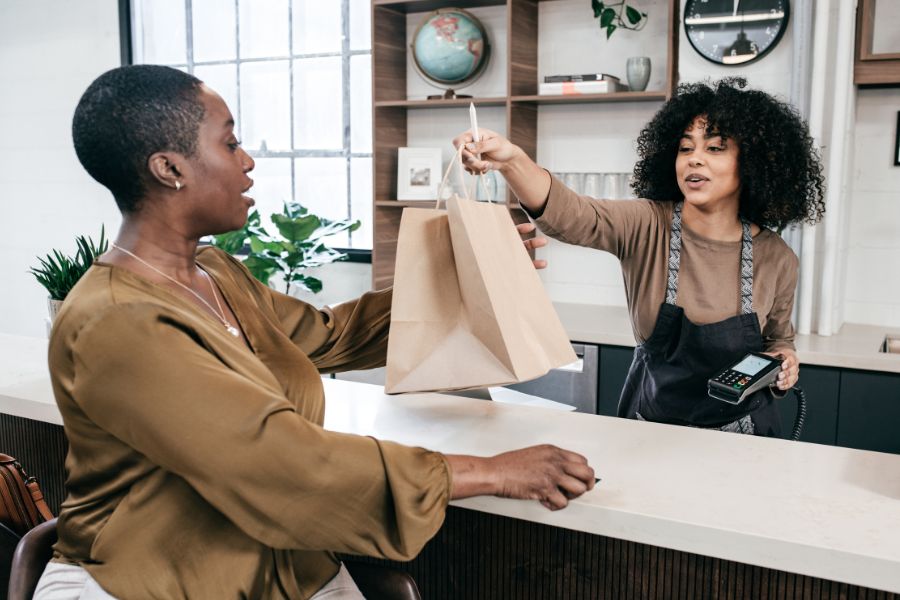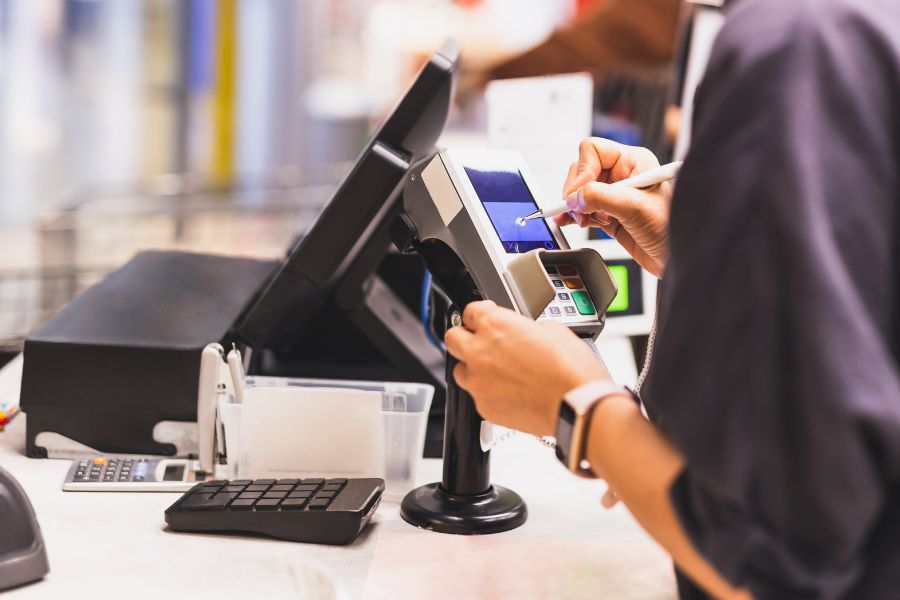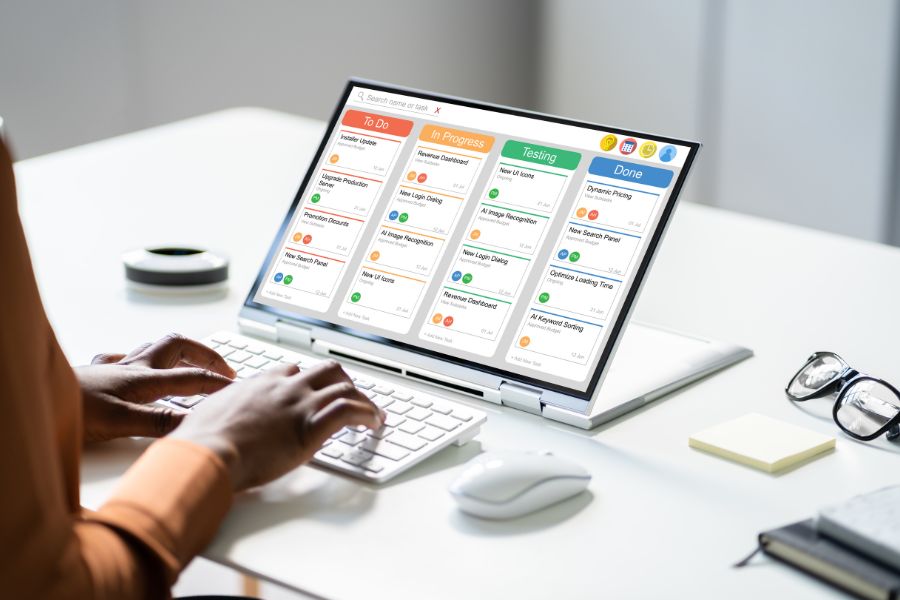The fashion retail industry in the UK is one of the world’s most dynamic and competitive sectors. It also faces many challenges and disruptions due to the COVID-19 pandemic, rising costs, changing customer demands, and environmental concerns. To survive and thrive in this fast-changing environment, fashion retailers need to adopt innovative solutions that can enhance their operational efficiency, customer satisfaction, and profitability. One of these solutions is a POS system.
A point-of-sale (POS) system is a software and hardware solution that enables retailers to process transactions, manage inventory, and collect customer data. A POS system can help fashion retailers streamline workflows, improve customer service, and optimize business performance. In this blog post, we will explore the benefits of POS solutions for fashion retail, the challenges of fashion retail in UK, and how ConnectPOS can help fashion retailers overcome the challenges and succeed.
The Benefits of POS Systems for Fashion Retail
A POS system can offer many advantages for fashion retailers, such as:
A Faster and Smoother Checkout Process
A point-of-sale system can speed up the checkout process by scanning barcodes, calculating prices, applying discounts, and processing payments. This system can also reduce human errors, such as mispricing, miscalculating, or miscounting. This can improve the accuracy and efficiency of the checkout process and reduce customer waiting time. A faster and smoother checkout process can enhance customer satisfaction and loyalty, as well as increase sales and revenue.
More Payment Options and Flexibility
A POS system can support multiple payment methods, such as cash, credit and debit cards, gift cards, mobile wallets, or online payments. It can also support multiple currencies, languages, and tax rates. This can provide more convenience and flexibility for customers who prefer different payment options or shop from different locations. A POS device can also enable split tenders and layaways, which allow customers to pay with more than one payment method or pay in installments. This can increase customer satisfaction and retention, as well as attract new customers.
Effective Promotion and Loyalty Programs
A POS system can help fashion retailers create and manage promotion and loyalty programs that can boost sales and customer loyalty. POS software can allow retailers to set up various promotion rules, such as buy one get one free, percentage off, or fixed amount off. It can also allow retailers to create loyalty programs that reward customers with points, coupons, or gifts based on their purchase history or preferences. This system can also track and analyze customer data, such as purchase frequency, average order value, or product preferences. This can help retailers tailor their marketing campaigns and offers to suit different customer segments and increase customer engagement.
Accurate Inventory and Stock Management
A POS system can help fashion retailers manage their inventory and stock levels across multiple locations and channels. It can provide real-time visibility into the stock availability, location, movement, and status of each product. A point-of-sale system can also automate the inventory replenishment process by generating purchase orders based on predefined criteria. This can help retailers avoid stockouts or overstocking, which can affect customer satisfaction and profitability. It can also enable inventory transfer among locations or select warehouses for fulfillment before checkout. This can optimize inventory allocation and distribution and reduce operational costs.
The Challenges of Fashion Retail in the UK
The fashion retail industry in the UK is facing many challenges and disruptions due to various factors, such as:
The Impact of COVID-19 Pandemic and Lockdowns
The COVID-19 pandemic has had a devastating impact on the fashion retail industry in the UK. The lockdowns imposed by the government have forced many physical stores to close temporarily or permanently. The social distancing measures have reduced foot traffic and consumer spending. The supply chain disruptions have caused delays or shortages of raw materials or finished products. Uncertainty and anxiety have changed consumer behavior and preferences. According to Statista, the revenue of the apparel market in the UK was estimated to be just under 55 billion British pounds in 2022, marginally less than in the previous year. However, the market is projected to recover, eventually reaching more than 65 billion British pounds by 2026.
The Rising Costs and Inflation
The fashion retail industry in the UK is facing rising costs and inflation due to various factors, such as Brexit, the energy crisis, labor shortage, transportation costs, raw material costs, import tariffs, exchange rates, taxes, rents, and wages. These factors can increase the operational costs and reduce the profit margins of fashion retailers. According to McKinsey, the UK inflation rate reached 5.1 percent in November 2022, the highest level since 2021. The rising costs and inflation can also affect consumer confidence and purchasing power, which can reduce the demand for fashion products.
The Increasing Competition and Customer Expectations
The fashion retail industry in the UK is facing increasing competition from both local and global players, as well as from online and offline channels. Online sales grew by a whopping 44 percent in 2020, as more than 76 percent of shoppers have shifted their buying habits online. The online platforms offer more convenience, variety, personalization, and lower prices than physical stores. The offline channels also offer more experiential, immersive, and interactive shopping experiences than online platforms. The fashion retailers need to differentiate themselves from their competitors by offering unique value propositions, such as quality, design, service, or sustainability.
The fashion retail industry in the UK is also facing increasing customer expectations due to changing consumer behavior and preferences. The customers are more informed, empowered, and demanding than ever before. They expect fast, easy, and seamless shopping experiences across multiple channels and devices. They expect more payment options and flexibility, such as buy now pay later, or pay in installments. They expect more promotions and loyalty programs that reward them for their purchases or referrals. They expect more transparency and accountability from fashion retailers regarding their environmental and social impacts.
The Need for Sustainability and Ethics
The fashion retail industry in the UK is facing the need for sustainability and ethics due to the growing awareness and concern of consumers, regulators, investors, and media about the environmental and social impacts of the fashion industry. The fashion industry is one of the most polluting and wasteful industries in the world. It consumes large amounts of water, energy, chemicals, and natural resources. It emits large amounts of greenhouse gases, toxic substances, and microplastics. It generates large amounts of waste, such as textile waste or packaging waste. It also contributes to various social issues, such as human rights violations, labor exploitation, animal cruelty, or cultural appropriation.
Fashion retailers need to adopt sustainable and ethical practices that can reduce their environmental and social footprints and enhance their reputation and trust among their stakeholders. Some of these practices include using organic or recycled materials, adopting circular or regenerative models, implementing fair trade or ethical sourcing policies, supporting local or social enterprises, promoting diversity or inclusion initiatives, or donating to charitable causes.
How ConnectPOS Can Help Fashion Retailers Overcome the Challenges and Achieve Success
ConnectPOS is a cloud-based POS system that integrates with Magento, Shopify, BigCommerce, and WooCommerce platforms. ConnectPOS can help fashion retailers overcome challenges and achieve success by offering omnichannel features, multiple payment methods, real-time synchronization, offline mode, advanced reporting, and customer management. Some of the benefits of this POS are:
- ConnectPOS can help fashion retailers provide a faster and smoother checkout process by scanning barcodes, calculating prices, applying discounts, processing payments, printing receipts, or emailing e-receipts.
- ConnectPOS can help fashion retailers offer more payment options and flexibility by supporting cash, credit and debit cards, gift cards, mobile wallets, online payments, split tenders, or layaways.
- ConnectPOS can help fashion retailers create effective promotion and loyalty programs by implementing promotion settings from Magento admin or creating loyalty programs that reward customers with points, coupons, or gifts based on their purchase history or preferences.
- ConnectPOS can help fashion retailers manage accurate inventory and stock management by providing real-time visibility into the stock availability, location, movement, and status of each product. ConnectPOS can also enable inventory transfer among locations or select warehouses for fulfillment before checkout.
- ConnectPOS can help fashion retailers cope with the impact of the COVID-19 pandemic by offering omnichannel features such as click-and-collect, buy online pickup in-store, buy online return in-store, or endless aisle. These features can help fashion retailers connect their online and offline channels and provide more convenience and safety for customers who prefer different shopping methods.
- ConnectPOS can help fashion retailers deal with rising costs and inflation by supporting multiple currencies, languages, and tax rates. These features can help fashion retailers cater to different markets and customers who shop from different locations.
- ConnectPOS can help fashion retailers provide better customer service by enabling customer management, which allows retailers to collect and store customer information, such as name, email, phone number, address, or purchase history. Retailers can also create customer groups and assign them to different loyalty programs or discounts. Retailers can also view customer profiles and purchase histories from POS and offer personalized recommendations or suggestions.
- ConnectPOS can help fashion retailers improve their business performance by providing advanced reporting, which allows retailers to access and analyze various reports and metrics, such as sales, revenue, profit, inventory, staff, or customers. Retailers can also filter the reports by date, time, location, channel, or product. Retailers can also export the reports to CSV or PDF formats for further analysis or sharing. Retailers can also integrate ConnectPOS with third-party analytics tools, such as Google Analytics or Metrilo, for more insights and optimization.
- ConnectPOS can help fashion retailers adopt sustainable and ethical practices by supporting digital receipts, which allow retailers to send receipts via email or text instead of printing them on paper. This can help reduce paper waste and environmental impact.
Conclusion
A POS system can boost fashion retail success in the UK by providing benefits (faster checkout, more payment options, promotion, and loyalty programs, inventory and stock management, etc.) and overcoming challenges (COVID-19, rising costs, competition, customer expectations, sustainability, etc.). ConnectPOS is a cloud-based point-of-sale system that works with Magento, Shopify, BigCommerce, and WooCommerce platforms. ConnectPOS can help fashion retailers succeed by offering omnichannel features, multiple payment methods, real-time synchronization, offline mode, advanced reporting, customer management, and more. Contact us today for a reliable, flexible, and affordable POS solution for your fashion retail business in the UK. We offer a free trial and a 24/7 support service. ConnectPOS can take your fashion retail business to the next level.
ConnectPOS is a all-in-one point of sale solution tailored to meet your eCommerce POS needs, streamline business operations, boost sales, and enhance customer experience in diverse industries. We offer custom POS with features, pricing, and plans to suit your unique business requirements.




